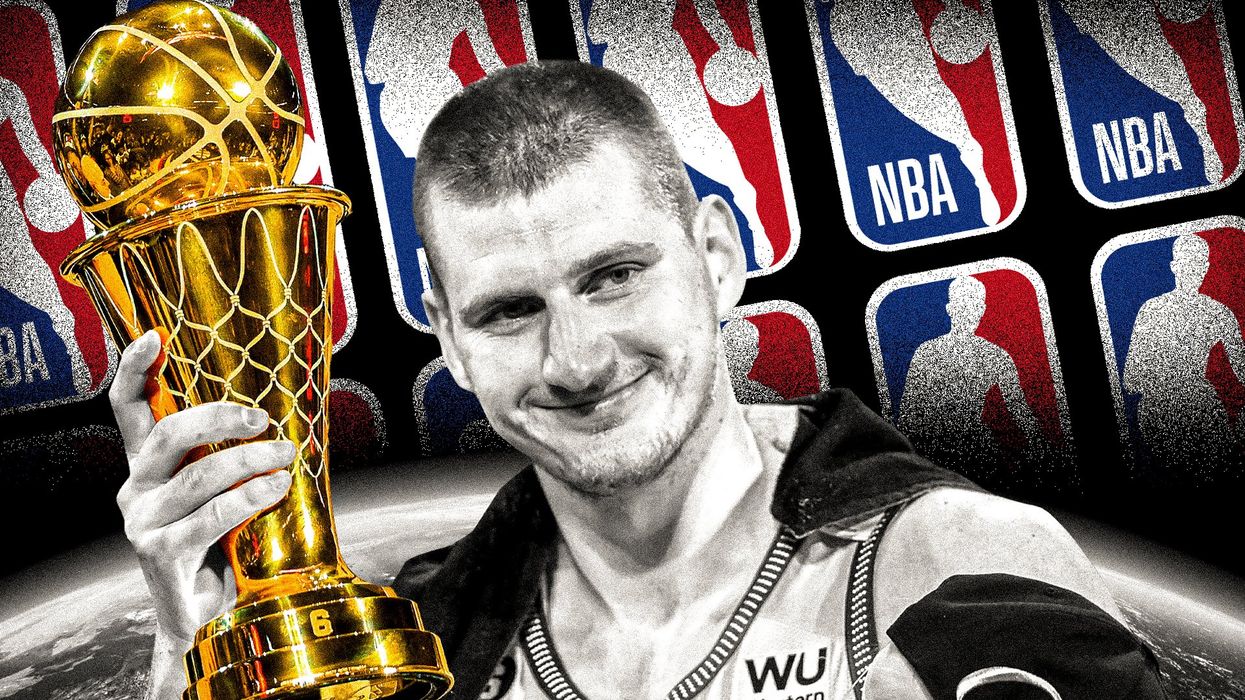
AAron Ontiveroz / Contributor | Getty Images

Nikola Jokic’s NBA Finals MVP and championship hit different, meaning they do not feel nearly as important as his predecessors’ crowning achievements.
That’s not intended as a knock on the Serbian superstar, who secured his first title Monday night with a victory over the Miami Heat. It’s a knock on the NBA and Nike’s 30-year global mission.
Globalism diminishes and dilutes everything it touches.
Last night, following the Denver Nuggets’ 94-89 victory, Jokic and his teammates had perhaps the most subdued championship celebration in the history of American sports. When asked by ESPN sideline reporter Lisa Salters how it felt to be champion of the NBA, Jokic replied:
“It’s good. It’s good. The job is done, and we can go home now.”
That’s not quite Kevin Garnett shouting, “Anything is possible,” in 2008. Inside the Nuggets’ locker room, there were no iconic moments of Jokic sobbing and hugging the Larry O’Brien Trophy with his dad comforting him. That’s what Michael Jordan did in 1991 after winning his first title.
In the moments after winning, Jokic spent more time hunting down Heat players to acknowledge and console than reveling in what his dominance created.
Again, I’m not knocking Nikola Jokic. He strikes me as humble, well-intentioned, and rational. He also strikes me as someone well aware that the NBA isn’t all that important.
That’s not good for American basketball. Passion foments fanaticism, and fanaticism drives interest in the game. Despite the best efforts of ESPN and Fox Sports 1 debate shows, the NBA is a lot less interesting than it used to be.
Globalism is partially to blame. The NBA’s best players – Jokic, Giannis Antetokounmpo, Joel Embiid, Luka Doncic, and Shai Gilgeous-Alexander – weren’t born in the United States.
They didn’t spend their childhoods following, thinking about, and learning the unique histories of NBA franchises. Embiid and Shai Alexander each had a tiny cup of coffee in American college basketball.
The foreigners do not revere the players who made the NBA great or the league’s history the way LeBron James and Steph Curry do. They can’t. Nor should they be expected to. The lack of reverence leads to a lack of passion.
For Nikola Jokic, the NBA is a fun, high-paying job. It allows him to take care of his family. It’s a great 9-to-5. It’s not how he defines his journey as a man. He couldn’t care less what Kendrick Perkins thinks of him or his back-to-back MVP trophies. This is healthy for Jokic. It’s bad for the NBA.
It’s an unintended consequence of the league’s pursuit of global dominance.
In the aftermath of Magic Johnson and Larry Bird making the NBA relevant to American sports fans, then-commissioner David Stern, at the behest of Nike founder Phil Knight, embarked on a journey to make the Association a global force.
The real purpose of the 1992 Dream Team, the collection of NBA stars who competed in the Barcelona Olympics, was to make the world pay attention to Michael Jordan and the league he dominated.
A decade after the Dream Team, Stern and the NBA negotiated a deal with the Chinese Communist Party to make Yao Ming the number one pick of the 2002 NBA Draft. Making Ming an NBA star keyed Stern’s strategy of one day landing a television contract from the CCP that would dwarf all the combined TV rights deals of the NFL.
Globalism was going to make the NBA (and, more importantly, Nike) more powerful and popular than the NFL.
Starting with Tim Duncan, who was born and reared in the Virgin Islands, 10 of the last 22 NBA MVPs were born outside the United States. Antetokounmpo, Jokic, and Embiid have won the last five MVP titles.
The NBA has been globalized. It’s not as interesting. It’s not as passionate.
As the kids say, the league hits different.
There’s no loyalty. As “Fearless” contributor Royce White likes to say, “There’s no sacred honor.”
Players hop from team to team. Look at LeBron James and Kevin Durant, the two most talented players of this era. They’ve played for seven teams combined. Magic, Larry, and Michael played for four.
When you remove borders, you remove boundaries and you decrease the value of honor, fidelity, and allegiance.
Professional sports are just another TV show, no different from “The Sopranos,” “Breaking Bad,” or “Game of Thrones.” A compelling narrative arc mixed with great character development determines the popularity of a TV show.
Tony Soprano’s complicated relationship with his mother and wife made “The Sopranos” must-see TV. We knew Tony’s backstory. We could relate to Tony’s backstory. He captured our imagination.
Larry Bird, Magic Johnson, Michael Jordan, and LeBron James captured our imagination. They were great American narrative arcs. The same is true for NFL stars. We know even more about them because their stories include fascinating college careers.
We’ll never relate to Nikola Jokic, Luka Doncic, and Giannis Antetokounmpo in the same way. They’re great players, great people. They’re not as relatable. And they don’t care about American traditions and history the way we do.
Jokic just wants to go home. I don’t blame him. Being a global citizen is overrated.Jason Whitlock
BlazeTV Host